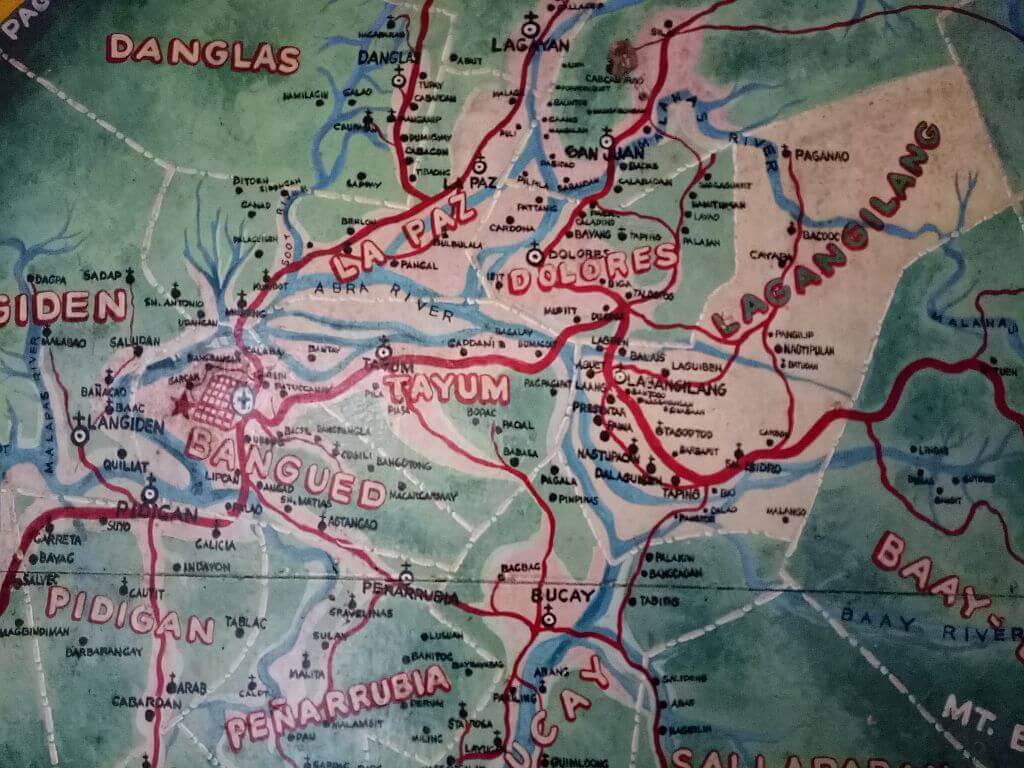LAGANGILANG | DAY TRIPS FROM BANGUED
POCKET GUIDE TO LAGANGILANG
Where is Lagangilang
Lagangilang is located 19km East of Bangued at 17°37′N 120°44′E in the Province of Abra. The town makes for a good day out since it is quite close to Bangued and has a frequent jeepney service. You could also combine Lagangilang with a tour of Tayum making it into a full days itinerary.
History of Lagangilang
According to legend, Lagangilang derived its name from combining the words ‘ilang-ilang” and “lagam”. Ilang-ilang, predominant in the municipality, is a tree whose flowers emit a distinctively sweet scent especially at night. Lagam, meaning bravery, is the name of a famous Tinguian leader who once ruled and defended the original Tinguian village of Lagangilang along the eastern bank of the Abra River from adversaries.(abra.gov.ph)
Lagangilang is subdivided into 17 Barangays: Aguet, Bacooc, Balais, Cayapa, Dalaguisan, Laguiben, Lagben, Laang, Nagtupacan, Nagtipulan, Pawa, Presentar, Tagodtod, Taping, Poblacion, Paganao, and San Isidro.

Lagangilang Seal Symbolism
Carabao Head – Symbolizes a beast of burden. The Carabao is the National Animal of the Philippines.
Hill – Represents the terrain of the municipality suitable for agro-livestock forestry.
Rice Paddies – Means extensive farmlands.
River – Stands for life, usually tapped for irrigation needs and water supply for farm animals.
Rice – Represents the staple crop of the municipality.
Trees – Symbolizes the eco-system.

Holy Cross Church, Lagangilang
In Lagangilang, the church is not situated beside the town plaza and Municipal Hall, as are most other churches in the Philippines.
The Church of the Holy Cross is located in Barangay Laang, which is a ten minute walk from the Plaza.
The Church built of red bricks was started in 1914 and finished in 1916. The Bell Tower was finished in 1931 and was renovated in 2010 with steel supports inserted to hang the Bells on.
The only parts of the original church remaining are the Bell Tower and the Apse. The original portal in the Bell Tower is now closed and a new entrance was made in the “new” centre portion of the church building.
Even with the concrete based reconstruction of the centre part, the Church remains a beautiful building in its own right. An ugly covered basketball court has been built in the adjoining school grounds and a covered walkway from the Parish Office have somewhat reduced the asthetics of the church though.
Outside the Parish Office on the left is a Relief Map of Abra showing the location of every church in the Province, including Parish Churches and Barangay Chapels,



Lagangilang’s American Era
Lagangilang benefited enourmously during the American Colonial Era with its school, church and numerous houses being built.One can still see American era structures in the Poblacion of Lagangilang.
One of the houses that lines the main road was built in 1933, the date can be seen on its balcony roof. The house opposite was built in 1926. A few other American Era houses stand out along the road. Its a pity that no-one is looking after them and preserving the Heritage of the town.


The Abra Institute of Science and Technology, Lagangilang
An important institution that helped shape the municipality is the 82 year old school established in 1908 during the American regime by an American named Amos E. Allen. The Americans took turn in its administration until 1917, when the first Filipino administrator, Jose Reyna, took over. The school became an agricultural college on June 6,1966, by virtue of Republic Act No. 4647. During World War II, the school served as the seat of the military government of Abra.
Inside the Campus are many old buildings, which are again in a poor state of repair and urgently need some restoration work doing to them.
Wandering around we found our way down to the Hanging Bridge, which crosses a fast flowing river, funded by donations from the “Batch of 1968”. On the other side are the coffee and Cacao growing areas.
In fact its interesting to see what each Batch left as a Legacy to the School.
My favourite was the Carabao statue at the entrance to the main building.
There’s also an Ecopark in the Campus but we didnt get a chance to explore it as we ran out of time.



ABRA - THE BEAUTY OF NATURE & HERITAGE

Lagangilang
Abra
Philippines
Open and Find Out How to travel to Abra
How to travel to Abra from Manila
By Bus
- From Metro Manila, there are three bus companies operating along the Manila to Bangued route.
Partas Bus Company, Viron Transit and Dominion Bus Lines. - Journey time is around 10 hours
- Fare at time of writing is P600
Bus Companies that link Bangued with other destinations are
Bangued to Manila, Baguio – Partas Bus Company
Bangued to Manila, Baguio – Dominion Bus Lines
Bangued to Manila, Baguio – Philippine Rabbit
Bangued to Baguio – Sambrano Bus Lines
Bangued to Manila – Viron Transit
Bangued to Vigan, Tuguegarao – Esonice Bus Lines
Bangued to Baguio, Vigan, Laoag – BBL Transit
By Air
There are no airports in Abra. The closest airport is Laoag, three hours away by car.
- Cebu Pacific and Philippine Airlines have daily flights to Laoag.
- From Laoag take a bus to Vigan and change there for a bus to Bangued
- Or take any bus that is heading south and alight at Narvacan for bus and jeepney connections to Bangued
Jeepney from Bangued to Lagangilang
Once you arrive in Bangued, take a tricycle to the jeepney terminal opposite the DPWH Compound.
Jeepneys leave for Lagangilang once an hour.
The trip takes around 30 to 40 minutes and the fare is P35.
Return trip to Bangued – The Jeepney departs once an hour from infront of Holy Cross Church in Brgy Laang and picks up passengers along the route
Jeepneys also leave the DPWH terminal for Dolores and San Juan
By Car or Motorbike
Leave Bangued on the road to Tayum. Drive through Tayum and across the Don Mariano Bridge. Keep going until you come to a large Blue waiting shed in the middle of the junction.
Follow the road to the right and continue until you reach Lagangilang.
Please Note – All blog post photos on Silverbackbacker.com are of a lower quality to enable faster loading and save you data. If you would like to buy or license higher quality copies of any of the photographs you can email us at silverbackpackertravels@gmail.com
All photographs and content on this website remain the property of Silverbackpacker.com. Images may not be downloaded, copied, reproduced or used in any way without prior written consent.
Print purchases entitle the purchaser to the ownership of the image but not to the copyrights of the image which still remain with Silverbackpacker.com even after purchase.
Follow Silverbackpacker for more of his Travels
Facebook @silverbackpacker | Instagram @silverbackpacker
Twitter @silverbackpaker | Pinterest @silverbackpaker
Audere Est Facere – Silverbackpacker.com – To Do is To Dare
Disclaimer | Privacy Policy | All Rights Reserved




Wow, what a fascinating place! I had never heard of Lagangilang before! Thanks for sharing 🙂
I’ve never heard of this place but I’d like to visit! It looks really charming. I love doing day trips when I visit an areas.
Lagangilang, the name though a tongue twister of sorts sounds so sweet. Interesting to learn about how this name was formed. Another fresh perspective of the Philippines, loved reading about this place and its colonial past. A fascinating place steeped in history.
Oh this is interesting. I had always heard about the Spanish colonial era in Philippines but I did not know that Americans were also there leaving that heritage in Lagangilang. It must be nice to smell the ilang-ilang scent at night
This town’s name is so fun to say! I’ve never heard of it, but it sounds like there are worthy stops and historic spots.
To be honest, I never heard of this place but now I know so much more about it! Thanks for providing this great pocket guide!
Looks like there is a lot of stuff to do! I like how their seal represents so many different parts of their culture and society
I am Filipino but I have not been to Abra. Thank you for this very informative post!
I love doing day trips when I’m visiting a place. I think it gives you a better overall feel for the area. An ecopark would be interesting, but even the history in this town is enough to explore.
Oh my husband would definitely love a visit at the Abra Institute of Science and Technology, as he likes everything science-related!